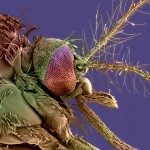Link to Pubmed [PMID] – 23151056
BMC Infect. Dis. 2012;12:300
BACKGROUND: The mosquito Aedes albopictus is undergoing a worldwide expansion with potential consequences on transmission of various arboviruses. This species has been first detected in Lebanon in 2003.
METHODS: We performed a phylogenetic study of Lebanese specimens and assessed their host preference by detecting human, cat, dog and chicken immunoglobulins in mosquito blood-meals. Their capacity to transmit arboviruses was investigated by providing infectious blood-meals using an artificial feeding system followed by detection of viral particles in mosquito saliva.
RESULTS: Our results suggest that Lebanese strains are part of the recent wave of Ae. albopictus expansion and are related to some European, African and North American strains. They exhibited a host preference towards humans and an important capacity to transmit arboviruses. Indeed, we showed that Ae. albopictus was able to transmit chikungunya (CHIKV), dengue (DENV) and West-Nile (WNV) viruses. At day 10 after an infectious blood-meal at a titer of 108 MID50/ml, 30% of mosquitoes delivered an average of 515 ± 781 viral particles of CHIKV in saliva collected using a forced salivation technique and 55% with an average of 245 ± 304 viral particles when infected with WNV. Whereas DENV was not found in saliva at day 10 post-infection (pi), an average of 174 ± 455 viral particles was detected in 38.1% of mosquitoes tested at day 21 after an infectious blood-meal at a higher titer of 109 MID50/ml.
CONCLUSION: These observations suggest that Ae. albopictus around Beirut is a potential vector of the three tested arboviruses.


